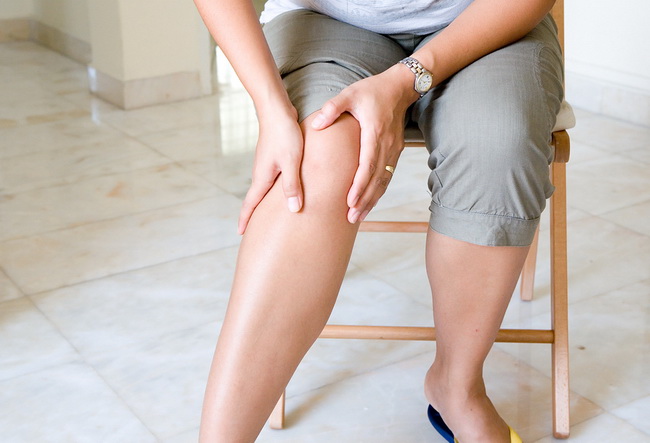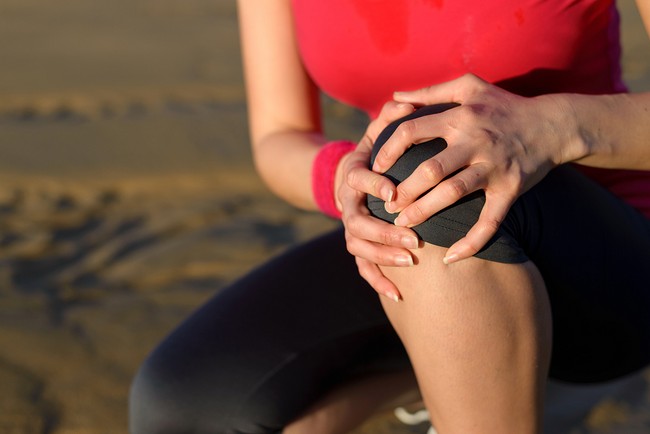- Make It Yourself Lavender Heart-Shaped Bath Bombs!
- 20 Things You Never Knew About “Down There”
- 12 Best Foods For Those Suffering From Arthritis Pain
- 12 Personal Hygiene Mistakes Almost Everyone Makes (Mom Never Told You About #4!)
- 15 Medicinal Plants And Herbs From The Cherokee People
- 12 Mind-Blowing Benefits Of Drinking Coconut Water During Pregnancy
- 12 Outstanding Winter Foods That Won’t Fatten You Up Like A Christmas Turkey
5 Common Habits Secretly Causing Your Knee Pain

Photo credit: bigstock.com
If you have ever experienced knee pain, you know how debilitating it can be. Even a minor injury seems to take forever to heal. Not being able to walk, or not walk without pain, can take a normal day and turn it on its head! It’s the simple things that sometimes end up causing you pain: twisting the knee while playing sports, or even a simple fall. However, sometimes the injury occurs from a lifetime of bad habits that you aren’t even aware of until you knee begins to ache.
When you consider the amount of work we demand from our knees every single day, and doing it all with your body weight on top of them, the only surprising thing is that injuries aren’t more common!
Your knee joint is a complex system of multiple components that can be completely incapacitated with just one wrong twist or fall. We are going to look at 5 of some common, and some less common, contributors to knee pain. You might be surprised to learn that simply correcting or dropping some of these habits will return your knees to their natural, healthy, pain-free state.
1. Posture
Most people believe that the only thing that is affected by their posture is their lower back, but it actually plays a huge role when it comes to your knees. When we refer to bad posture we mean locking your knees backwards as you stand, holding all your weight on one leg, slouching over with your stomach pushed forward or your head pushed forward. What you want to do is to straighten your posture, hold your head on top of your shoulders, and distribute your weight evenly on both legs.
2. Being Overweight
OK, so perhaps this isn’t a habit, but overeating surely is. When you allow your body weight to continue to increase a few pounds every year continues to add to the pressure on your knees. For every one pound of extra weight you are carrying, your knees have 3 extra pounds of pressure put on them. Being overweight is commonly linked to knee pain. Unfortunately, it is also linked to osteoarthritis of the knees.
Osteoarthritis will break down your knee cartilage much more quickly than normal, greatly increasing the chances that you will injure your knees. Work toward keeping your weight within the normal range and if you are overweight, try losing a few pounds every single month. In fact, according to the National Institutes of Health, a recent study showed that people who were overweight reduced their risk of developing osteoarthritis by as much as 50 percent simply by losing 10 pounds.
Continue to Page 2

Photo credit: bigstock.com
3. Joint and Muscle Over Exertion
Although physical activity is good for the knees, too much of anything is not good. Continuing to do the knee straining activities day after day, without rest, give your knees some serious stress with no opportunity for them to heal. Simply adding some variety to your workout routine and allowing your body at least one day of rest per week can help your knees tremendously.
If you should feel pain in your knees or if they ache or become stiff after a particularly difficult workout or from some other activity, do not feel guilty by taking a day or two off and allowing them time to repair themselves.
SEE ALSO: Top 5 Knee Problems: How to Fix Them and How to Avoid Them
4. Bad Shoes
Ladies, those Jimmy Choo’s look so cool on the dance floor, but they pull your body out of balance and they will give you some serious knee pain over time! The right shoes are just as important as anything else when it comes to taking care of your knees. Although they might not be as stylish, look for a shoe that fits comfortably and will distribute your weight evenly, which will reduce the stress on your knees.
Don’t misunderstand us: we are not suggesting that you ditch those cool Saturday Night Fever heels, but save them for just that – special occasions – and don’t wear them every day. Several studies have shown that wearing high heeled shoes on a regular basis is one of the biggest risk factors for foot and knee injuries in women.
Runners, you aren’t exempt here. Always choose your running shoes carefully. You should choose the correct design for your foot shape, size, and running habits. Also, never run a marathon in high heels, no matter how cool they look.
Continue to Page 3

Photo credit: bigstock.com
5. Lack of Exercise
You might think that not moving your knees would be the best thing you can do for them, but the opposite is true. Although exercise can be a double edged sword, with too much exercise being just as bad as no exercise. Your knee relies on the muscles of the legs to work properly without stress. So while you want to get some exercise, you don’t want to overdo it.
Be certain to stretch and warm up before you begin exercising. Think of muscles like springs that need to be loosened up before they start bouncing or they might snap and break. Choose an exercise that will have the lowest impact on the knees such as swimming, biking, yoga, or walking. After your leg muscles are stronger, you can do more strenuous exercises. Keep in mind that running, even on a treadmill, puts a great deal of stress on the knees.
Perhaps one of the best pieces of advice you can take is to pay close attention to how your knee feels. If you develop pain that does not go away after a few days of rest, you should see a doctor as soon as possible. Knee injuries only get worse over time, so early treatment can make a huge difference between knees that recover and knees that continue to hurt for the rest of your life. Give your knees rest, ice packs, hot baths, elevation, and compression at the first sign of injury or pain and if these methods do not work, consult a physician.
References:

































